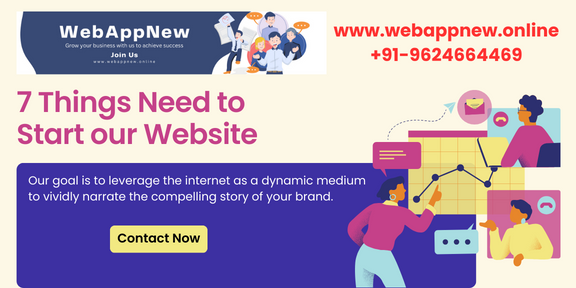Starting a New website is an exciting venture that opens up numerous possibilities for personal expression, business growth, or community building. However, the journey begins with careful planning and execution. Let’s delve into the seven essential things you need to kickstart your website successfully.
Introduction
Embarking on the journey of creating a website requires a thoughtful approach. It’s not just about having an online presence; it’s about crafting a space that resonates with your audience and serves its purpose effectively.
Clear Vision and Purpose
Before diving into the technical aspects, take a moment to define your website’s goals. Are you showcasing your portfolio, selling products, or creating a blog? Understanding your purpose helps shape the entire trajectory of your website.
Domain Name Selection
Your domain name is your online identity. It should be memorable, relevant to your content, and easy to spell. Consider keywords related to your niche and ensure it reflects the essence of your website.
Responsive Web Design
In an era where mobile devices dominate internet usage, having a responsive design is non-negotiable. Ensure your website looks and functions seamlessly across various devices, providing an optimal user experience.
Content Strategy
Content is king, and a well-thought-out strategy is the crown. Plan your content hierarchy, organize it logically, and ensure it aligns with your audience’s interests. Quality content not only attracts but retains visitors.
SEO Essentials
Understanding the basics of SEO is crucial for visibility. Conduct keyword research to identify phrases relevant to your content. Incorporate these strategically in your headlines, meta tags, and throughout your content.
User-Friendly Navigation
Creating an intuitive navigation structure is like laying a path for your visitors. Make it easy for them to find what they’re looking for. A seamless user experience encourages longer stays and repeat visits.
Security Measures
Website security is paramount. Protect your website and your visitors by implementing security measures. Regularly update software, use secure hosting, and consider obtaining an SSL certificate.
Social Media Integration
Harness the power of social media to promote your website. Integrate social sharing buttons, showcase your content on relevant platforms, and engage with your audience. Social media is a valuable tool for expanding your reach.
Analytics and Tracking
Monitoring your website’s performance is essential for growth. Use analytics tools to track visitor behavior, popular content, and sources of traffic. Data-driven decisions pave the way for continuous improvement.
Optimized Images and Multimedia
Visual appeal matters. Optimize your images for faster loading times, and ensure multimedia content enhances, rather than detracts from, the user experience.
Regular Updates and Maintenance
A neglected website is a stagnant one. Regularly update your content, check for broken links, and ensure all features are working correctly. A well-maintained website reflects professionalism and reliability.
Building a Community
Encourage user engagement by fostering a sense of community. Respond to comments, create forums, and provide opportunities for your audience to connect with each other.
Monetization Strategies
If your goal is to generate revenue, explore various monetization strategies. However, balance is key. Ensure your methods don’t compromise the user experience.
Conclusion
Starting a website is a rewarding endeavor that requires a blend of creativity, strategy, and technical know-how. By focusing on these seven key elements, you lay a solid foundation for a successful online presence. Now, take the plunge and watch your digital space thrive.
FAQs
How long does it take to start a website?
Starting a website can vary in time, but with careful planning, you can have a basic site up and running in a matter of days.
Is a responsive design really necessary?
Absolutely. With the majority of internet users on mobile devices, a responsive design ensures your website caters to all audiences.
Do I need to be tech-savvy to start a website?
Not necessarily. Many user-friendly platforms exist, allowing beginners to create a website with minimal technical knowledge.
Can I change my domain name later?
While possible, it’s advisable to choose a domain name thoughtfully as changing it later can affect your branding and SEO.
How often should I update my website?
Regular updates are essential. Aim for at least monthly content updates and check for technical issues weekly.


